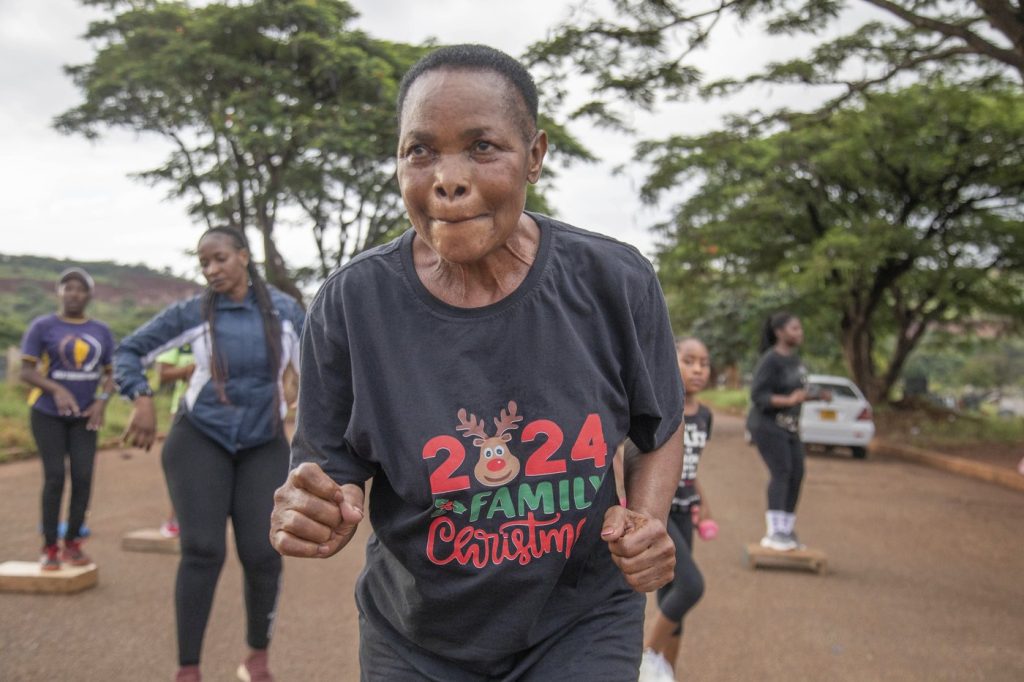HARARE, Zimbabwe (AP) - In a unique and unconventional exercise setting, 65-year-old Nelly Mutandwa has found a way to manage her diabetes. At dawn, she swaps her pajamas for leggings, a T-shirt, and sneakers, before gathering with fellow members of the Commandos Fitness Club for a workout session among the graves in a cemetery in Harare, Zimbabwe's capital.
For Mutandwa and her companions, this daily routine is more than just physical exercise; it represents a commitment to health and life. Surrounded by rows of graves, Mutandwa reflects on her motivation—“They are resting,” she says, pointing to the graves. “I just don’t want to join them yet. That means I have to do the hard work here.”
The concept of outdoor exercise in such settings is a reflection of a broader trend among older Zimbabweans. With limited access to traditional fitness facilities like gyms in their neighborhoods, many are resorting to exercise in unconventional locations, such as highways or abandoned railway lines, as a means to combat rising non-communicable diseases (NCDs) like heart disease, high blood pressure, and diabetes.
According to the World Health Organization (WHO), NCDs are now the leading cause of death globally, accounting for 41 million fatalities per year, which represents 74% of all annual deaths. In Zimbabwe, these diseases are responsible for roughly 40% of annual fatalities. As Africa experiences rapid population growth and a youthful demographic, experts warn that NCDs are increasingly affecting younger generations, previously thought to be primarily at risk only in older adults.
Dr. Johannes Marisa, a public health specialist in Harare, notes a concerning trend: more children and young adults are being diagnosed with NCDs due to lifestyle changes, including sedentary habits linked to increased screen time and substance abuse. This is compounded by the availability of fast food, with urban areas like Harare witnessing a surge in quick-service restaurants and informal dining options that contribute to unhealthy diets.
The rise of fast food is particularly troubling in urban Zimbabwe, where the Finance Minister Mthuli Ncube proposed a modest 0.5% tax on unhealthy food items in the 2025 national budget. This move aims to encourage healthier dietary choices among the population and combat the prevalence of NCDs.
While the urban landscape presents challenges, some older Zimbabweans, including Mutandwa, are embracing physical fitness as a life-affirming activity. Members of the Commandos Fitness Club, coached by Joseph Nekati, have created a supportive community where older adults can gather to exercise. The club is free and has become a sanctuary for about 20 members, eight of whom are older individuals.
Another member, 64-year-old Susan Gomo, shared her weight-loss journey, indicating a significant change in her health. “I weighed 86 kilograms (189 pounds) and struggled to stand up. I would struggle to breathe just walking in my house. Now, I’m down to 76 kilograms (167 pounds) and I can walk long distances,” she said, managing high blood pressure and arthritis.
Mutandwa's journey into fitness began when she visited her daughter in the United Kingdom in 2022, where she discovered the benefits of power walking. Upon returning to Zimbabwe, she sought safe places to walk and eventually found the Commandos Fitness Club in the cemetery, where well-maintained pathways provided a serene and secure environment for exercising.
The cemetery has thus become a symbol of resilience and determination for Mutandwa and her fellow fitness enthusiasts, who strive to maintain their health and vitality amid growing health concerns. “It’s serene, it’s safe and we have a lot of space with minimal disturbances,” she concluded, as she prepared to walk back home, hopeful for the future development of proper fitness facilities by the local council.










